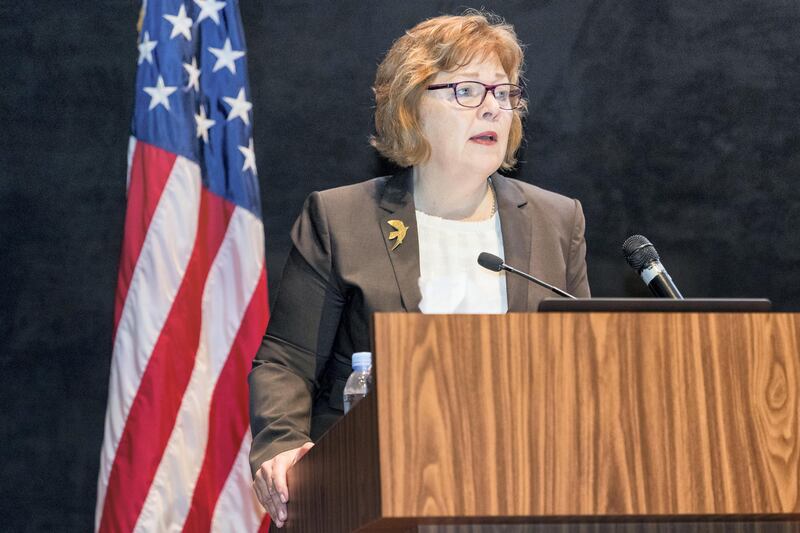The United States has announced that it will open a diabetes training centre in the UAE in a joint commitment to combat the condition that plagues both countries.
US ambassador Barbara Leaf revealed the plan at a Discover America event on Monday, where it was also announced that the UAE said it would become the first country in the world to introduce a new technology that means diabetics no longer need to inject themselves with insulin.
The ITCA 650 is as small as a matchstick and is inserted under the skin of patients with type 2 diabetes. It delivers a consistent flow of medication for a year until it is taken out and replaced, meaning no more injections.
“Personally, I signed the agreement with the developer country for the Emirates to be the first country in the world to introduce this technology and make sure our patients have access to the most innovative technology in the world,” said Dr Amin Al Amiri, assistant undersecretary at the Ministry of Health and Prevention.
The Abbott Diabetes Academy will be located in Dubai and will cooperate with the UAE in tackling a condition that affects more than one million people in the country. Details of who it would be training and when it will open were not revealed.
“This will be the first training programme of its kind in the Middle East, and a great example of an American business sharing knowledge as a good corporate citizen and friend,” the ambassador said.
“During the three years that I have been US ambassador to the UAE, I have witnessed our relationship continue to grow and deepen. With over $25 billion (Dh92bn) in two-way trade, the UAE is America’s largest export destination in the Middle East.
“More than 1,500 US firms are currently doing business in this country, and over 60,000 Americans live and work here.”
Ms Leaf said the “shared concern” of diabetes helped lead to the partnership.
“Tackling diabetes is a chief priority of the UAE Government, and we are committed to supporting our partner in this effort,” she said.
Held at the Mohammed bin Rashid University of Medicine, the two-day Discover America symposium was focused on nutrition, obesity and diabetes and brought experts from the US and the UAE together to share their experiences and ideas.
Speaking on the seriousness of the problem, Ms Leaf said that in America, adult obesity rates now exceed 35 per cent in five states and touch 30 per cent in 25 states. Ten of the 12 states with the highest type 2 diabetes rates are in the south, and the Center for Disease Control projects that one in three adults in the US could have diabetes by 2050.
_________________________
Read more:
[ Early diabetes detection programmes launched in clinics across UAE ]
[ Dubai health care symposium aims to tackle obesity epidemic in UAE ]
[ UAE invited to Discover America ]
_________________________
Compounding this problem is the fact that 80 per cent of American adults do not meet their government's national physical activity recommendations for aerobic activity and muscle strengthening. About 45 per cent of American adults are not sufficiently active to achieve health benefits, the ambassador said.
In the UAE, 37 per cent of the population are classified as obese, which makes it third worst in the Middle East, according to a recent study published by a BMC Public Health journal.
In addition, figures from the International Diabetes Federation (IDF) revealed that almost one in five people in the UAE between the ages of 20 and 79 have type 2 diabetes. In 2015, there were more than one million people living with diabetes in the UAE, placing the country 13th worldwide for age-adjusted comparative prevalence.
Trends also indicate that the prevalence of diabetes in the UAE is rising at a faster rate than both the Mena region and the rest of the world. Rapid economic growth, sedentary lifestyles and unhealthy diets are combining to exacerbate the problem, which is expected to worsen to the extent that, by 2040, the number of people with diabetes is expected to double to 2.2 million.
“Fully aware of these troubling statistics, the UAE has long ago recognised the severity of the problem and its impact on future generations. The amount of work that has been done to curb the growth of obesity and diabetes is commendable and we hope that some of those lessons are taken back to the US and shared with the wider community,” said Ms Leaf. “The inauguration of our healthcare symposium is yet another example of this proactive, strategic effort.”
Dr Omniyat Al Hajri, director of public health and research at the department of health, said the next step should be expanding partnerships and motivating and engaging the community.
“We are at a stage where our federal plans will reach every citizen in the country. We are also working on our community engagement plans,” she said.
“We need a system that is sustainable and does not stop with people who study medicine or work in the government. We need to transfer that centre of control to the people’s hands and make sure that we create supportive communities that bring people together. It’s a huge challenge and we need to integrate all our efforts across the country.”





